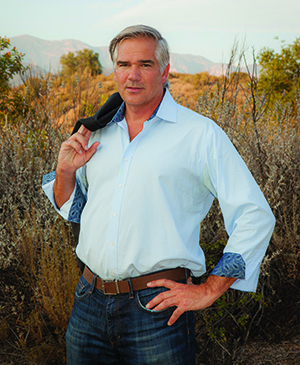Editor’s Note | By Bret Bradigan
Hated Symbol Appears in Ojai

Bret Bradigan
Much will be made about the actions of the nine students at Matilija Middle School who back in December formed into the shape of a swastika and also posted offensive, violent and threatening commentary on a group chat. Much should be made.
It is a “teachable moment.” But it is not an indictment of these kids, their parents or their school. At the age, kids will do anything for attention; today’s alt-right youth can be tomorrow’s social justice warriors (and, unfortunately, the other way around). They do not have the capacity to understand the enormity of their offensive actions. That’s why we need to teach them.
The Nazi swastika (into which these students formed themselves) may be the most toxic of all symbols, far too representative of the worst of humanity to ever be redeemed. The Confederate flag follows a close second, at least in America. (Though, in the “Teddy Perkins” episode on “Atlanta,” the character played by Lakeith Stanfield purchases a trucker cap with a Confederate flag emblazoned with the words, “Southern Man.” He takes a Sharpie to it, leaving the message “U Mad? That is an example of the transformative power of art, of satire and irreverence.)
For those who think that economic and social policy are two separate realms, the work of Elias Canetti stands as a useful corrective. Canetti deftly and quickly explained Hitler’s rise in “Crowds and Power,” a book he started working on in 1935, just two years after Hitler’s ascendency, and one he didn’t complete until 1960. A lot went on in those intervening years, giving him powerful material for his revolutionary approach to the crossroads of history and psychology.
Speaking about the rampant inflation of the Weimar Republic, Canetti observed that the sudden depreciation of wealth. “No one ever forgets a sudden depreciation of himself, for it is too painful. Unless he can thrust it on to someone else, he carries it with him for the rest of his life.” In that “thrust” of projecting powerlessness is contained the central tragedy of the 20th century, the Holocaust.
“If the inflation has led only to the depreciation of Germans as individuals, the incitement of hatred against individual Jews would have sufficed. But this was not so, for, when their millions tumbled, the Germans also felt humiliated as a crowd. Hitler saw this clearly and therefore turned his activities against the Jews as a whole,” Canetti wrote. If Germany’s then-large, cosmopolitan Jewish community had not existed, it would have been necessary to invent them.
I see the same forces at work today, though without the careful and evil design. It’s much more haphazard as befit this age of social media, though the scapegoating is no less dangerous. We’ve been reminded through this incident that Ojai isn’t immune to the distancing and dehumanizing perils of racism and bigotry. If as many expect our country goes into a recession in 2019, we will be particularly vulnerable to the pleas of autocrats and demagogues. We’d best be on guard.
As George Orwell so memorably wrote, “Every joke is a tiny revolution.” Dictators cannot stand to be mocked, and for good reason. Canetti is full of powerful insights into the darkest recesses of human nature. Even laughter, such a basic and necessary action, has its dark side. We shouldn’t be afraid to understand the forces that shape us as a species.
“Laughter has been objected to as vulgar because, in laughing, the mouth is opened wide and the teeth are shown. Originally laughter contained a feeling of pleasure in peril or food which seemed certain,” he wrote. “… laughter is our physical reaction to the escape of potential food,” he wrote in “Crowds and Power.”
In other words, we laugh er’st we eat. Laughter was the beginning of a civilizing force. That’s not to say that every laugh is a violent action subverted, but the first laugh was certainly so.
Hopefully, in a few years, these students will have a fuller, more empathetic understanding of the tragedies of history and come to regret their youthful actions. This is not who we are in Ojai, nor will it ever be.

Leave A Comment